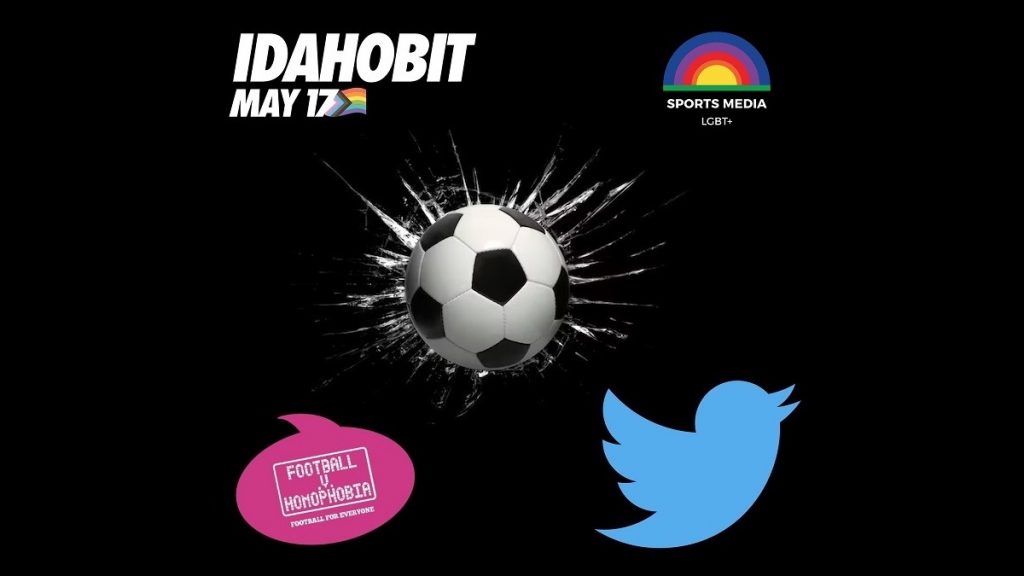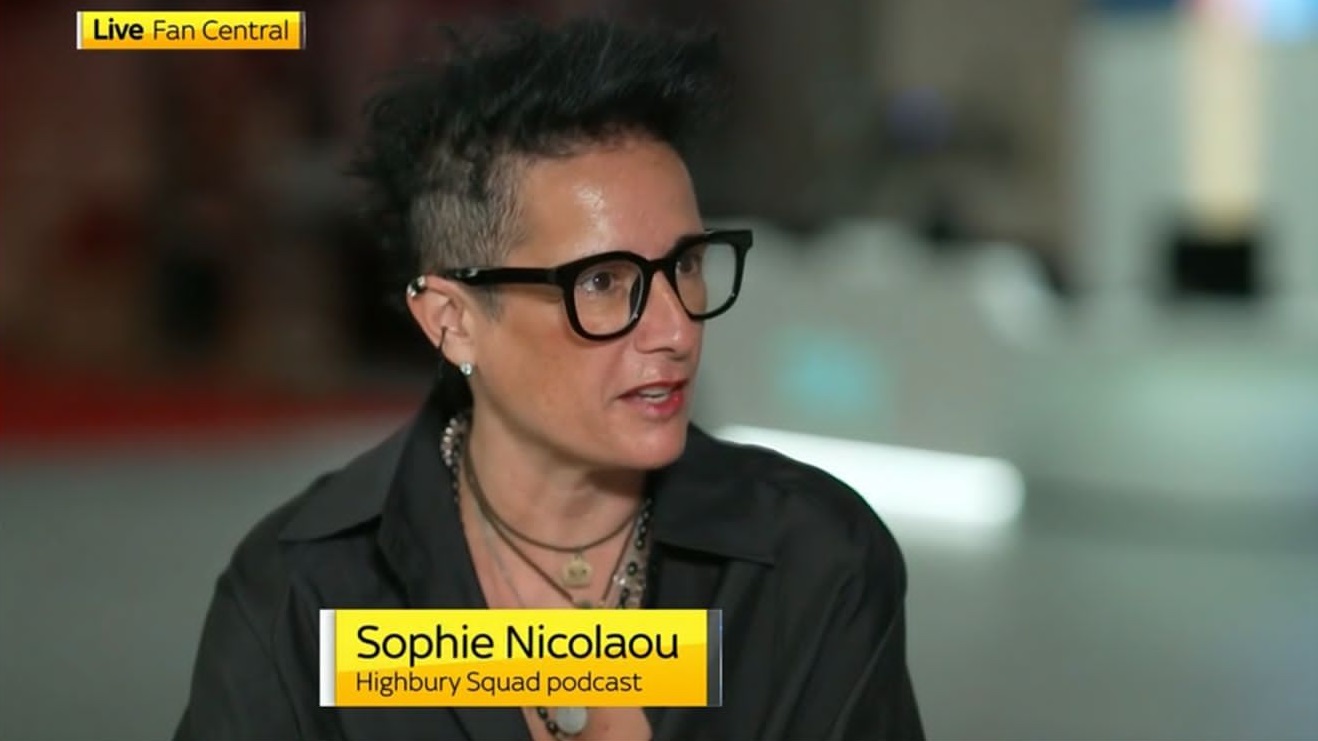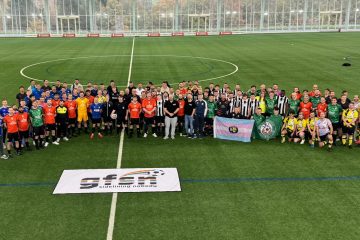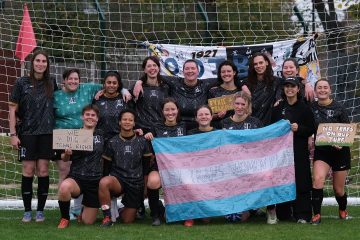What’s the impact of homophobic abuse on ‘Football Twitter’? A conversation for IDAHOBIT
‘Football Twitter’ has been described as “a nightmare of noise” – and anti-LGBTQ+ abuse thrives amid its tit-for-tat exchanges; researcher Finbarr Toesland and broadcaster Sophie Nicolaou discuss the effects of the social media platform’s tribalism on a special Football v Homophobia Podcast episode for IDAHOBIT…

When Finbarr Toesland asked fellow LGBTQ+ journalists where they receive abuse, 88% of respondents said it comes to them through Twitter.

Toesland is the author of a new report exploring the impact on journalists of attacks related to their sexual orientation and gender identity.
Among those he surveyed were people who work in football and wider sports media – and of all the social platforms, Twitter is overwhelmingly where they encounter homophobia and other forms of anti-LGBTQ+ discrimination most often.
In comparison, only 33% of respondents said they get abuse through Facebook, while just 24% told Toesland they are sent discriminatory messages on Instagram.
‘Football Twitter’ (or ‘FT’) has a particularly bad reputation for abuse – and it appears to be getting worse.
FT can be loosely defined as a section of the platform’s userbase within which die-hard fans, media personalities, influencers, content creators – and trolls – frequently converse and collide.
It’s where a hot take can either find healthy amplification or lead to an avalanche of harassment. In a Guardian column in February, Sachin Nakrani called FT “a nightmare of noise” and explained how club loyalties churn up even more discriminatory abuse within its subculture.
To mark the May 17 awareness day of IDAHOBIT – the International Day Against Homophobia, Transphobia and Biphobia – Toesland is a guest on a special episode of the Football v Homophobia Podcast that takes a deep dive into the murkier waters of FT.
He tells the pod: “We interviewed several sports journalists and I was surprised at how challenging it can be for them, especially in the UK. The mental health aspect of it has been underdiscussed.”
For this conversation, he’s joined by broadcaster Sophie Nicolaou, who is a host and producer on The Highbury Squad – an Arsenal podcast and YouTube show – and a contributor to Sky Sports News, talkSPORT and other outlets.
She’s also the Head of Content at Pride 365, which helps organisations improve LGBTQ+ inclusion in the workplace and which supports InterPride, the global hub for those putting on Pride events.

Since Sophie signed up to Twitter in its early days, the ‘bird app’ has been a place to showcase her work, attract an audience and discover opportunities in football.
However, having an active presence there can sometimes be gruelling, such as in the aftermath of a recent SSN appearance where she discussed Arsenal’s Premier League defeat at Manchester City.
“You have to be authentic when you’re talking about football because real fans see through all of that,” she tells pod host Jon Holmes.
“I spoke my truth and gave my opinion and it did not sit well with certain City fans. I spent three days fighting off horrible abuse.”
She makes the analogy of feeling like ‘Wonder Woman’ deflecting a hail of bullets with her metal bracelets. When the comments turn nasty – as they often do – they tend to be sexist, misogynistic and homophobic.
Occasionally however, there is a silver lining, such as making a strong connection with a fellow LGBTQ+ person or ally who replies in solidarity.
With it also being Mental Health Awareness Week, Sophie talks about the wellbeing benefits of building ‘tribes’ and cultivating communities online.
“So many people reached out to me to check that I was OK,” she adds. “I’m really grateful for that. So it also showed the beauty of what social media can do.
“Out of something terrible came something great – I think that happens to a lot of people and we don’t talk about that enough.”
‘In football, there’s more than passion’
A firestorm of angry tweets can often flare up unexpectedly. Toesland was even caught in one upon the report’s release, by a group of anti-trans accounts complaining about methodology and other aspects of his research.
They were alerted by mainstream media coverage of the study – commissioned by The Sir Lenny Henry Centre for Media Diversity, based at Birmingham City University – in The Guardian. The report has also been picked up by Press Gazette, and LGBTQ+ outlets PinkNews and Gay Times.
Toesland singles out Twitter as “the sole vector of abuse” for LGBTQ+ journalists and he has learned how talking about football on the platform often makes you even more of a target.
“My research has found that, for some reason, the anonymity provided to a lot of people means they say whatever they want to say,” he tells the podcast.
‘FT’ in particular is full of accounts where names and profile pictures are of players, coaches and other football personalities, not of the users themselves.
Toesland cites the “intensity and repetition” generated by many of these accounts.
“Even if it’s just a couple of people, it can have an outsized impact,” he adds. “It’s easy to say anything and get away with it.
“In all the sectors I covered, I would say sport was the most intense in terms of feelings and abuse. In football, there’s more than passion – it’s people’s entire lives.
“When it’s used well, it can be beneficial, but when it’s not, it can be devastating.”
Also on the podcast episode, Sophie and Finn discuss:
- reactions on Twitter to milestone LGBTQ+ football moments, such as professional players coming out in the men’s game
- what role media organisations should play in looking after their LGBTQ+ employees and occasional contributors such as Sophie
- whether social media can still be thought of as a force for good amid the rising toxicity, such as seen in the turbulent tenure of Elon Musk at Twitter
Listen to the episode in full here – and let us know your thoughts on social media using the hashtags #FvH2023 and #IDAHOBIT.
You can also check out previous FvH Podcast episodes, including our recent chat with Beth Fisher and Lou Englefield looking at the complicated relationship between women’s football and Lesbian Visibility Week.
Further reading and viewing…
Report: ‘Are media organisations adequately protecting LGBTQ journalists from harassment and abuse?’ (Finbarr Toesland for The Sir Lenny Henry Centre for Media Diversity)
‘Football Twitter’ is a nightmare of abuse and attention-seeking, so I walked away (Sachin Nakrani, The Guardian, February 2023)
IDAHOBIT, and homophobia: Sports and thoughts
More FvH content in our archive


